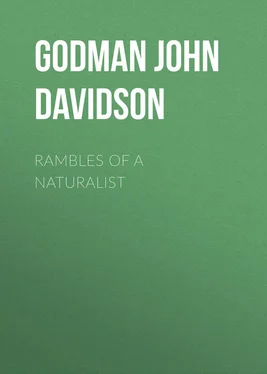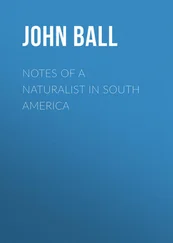John Godman - Rambles of a Naturalist
Здесь есть возможность читать онлайн «John Godman - Rambles of a Naturalist» — ознакомительный отрывок электронной книги совершенно бесплатно, а после прочтения отрывка купить полную версию. В некоторых случаях можно слушать аудио, скачать через торрент в формате fb2 и присутствует краткое содержание. Жанр: История, foreign_antique, foreign_prose, на английском языке. Описание произведения, (предисловие) а так же отзывы посетителей доступны на портале библиотеки ЛибКат.
- Название:Rambles of a Naturalist
- Автор:
- Жанр:
- Год:неизвестен
- ISBN:нет данных
- Рейтинг книги:4 / 5. Голосов: 1
-
Избранное:Добавить в избранное
- Отзывы:
-
Ваша оценка:
- 80
- 1
- 2
- 3
- 4
- 5
Rambles of a Naturalist: краткое содержание, описание и аннотация
Предлагаем к чтению аннотацию, описание, краткое содержание или предисловие (зависит от того, что написал сам автор книги «Rambles of a Naturalist»). Если вы не нашли необходимую информацию о книге — напишите в комментариях, мы постараемся отыскать её.
Rambles of a Naturalist — читать онлайн ознакомительный отрывок
Ниже представлен текст книги, разбитый по страницам. Система сохранения места последней прочитанной страницы, позволяет с удобством читать онлайн бесплатно книгу «Rambles of a Naturalist», без необходимости каждый раз заново искать на чём Вы остановились. Поставьте закладку, и сможете в любой момент перейти на страницу, на которой закончили чтение.
Интервал:
Закладка:
John D. Godman
Rambles of a Naturalist
The account of the life and character of Dr. John D. Godman has been prepared from the several brief memoirs and eulogies published shortly after his decease, and from the tract issued by "The Tract Association of Friends," entitled "A Sketch of the Life and Character of Dr. John D. Godman."
"The Rambles of a Naturalist" have been republished from "The Friend," a weekly paper, for the columns of which the essays were originally contributed.
Dr. John D. Godman, the author of the pleasing descriptions which, under their simple title, "Rambles of a Naturalist," contain so much of the beautiful and true, was born at Annapolis, in Maryland, in the year 1798. At a very early age he was deprived, by their death, of both his parents. He was then placed under the care of an aunt, whose intellectual attainments and elevated piety, united to much sweetness of disposition, eminently qualified her for the direction of the youthful mind. His fondness for books and aptitude for learning were remarkable; while his frank, sensitive, and sweet temper gained the affection of all around him. It is said that he had such a reverence for truth, even from infancy, that he was never known to equivocate. When he attained the age of six years, his excellent aunt died. The patrimony which should have provided for his wants, was lost through the mismanagement of those to whom the care of it had been entrusted; and thus, without resources, and without suitable protection, he was left exposed to adversity and temptation. It appears, however, that the moral and religious impressions which had already been made upon his mind, though obscured for a time, were never obliterated. In his last illness he bore this testimony to the affectionate religious care of his pious aunt. "If," said he, "I have ever been led to do any good, it has been through the influence of her example, instruction, and prayers."
Little is known of the next ten years of his life. He appears to have had some opportunities for attending school; but to his own native energy and uncommon intellectual endowments, self cultured under many obstacles and discouragements, is his future superiority of mental attainment to be chiefly attributed. An interesting incident of his character, after he had attained his fifteenth year, has been furnished by a physician who was, in 1810, a senior student in the office of Dr. Thomas E. Bond, of Baltimore. "The office," says he, "was fitted up with taste, and boys, attracted by its appearance, would frequently drop in to gaze on the labelled jars and drawers. Among them I discovered one evening an interesting lad, who was amusing himself with the manner in which his comrades pronounced the 'hard words' with which the furniture was labelled. He appeared to be quite an adept in the Latin language. A strong curiosity soon prompted me to inquire, 'What is your name, my little boy?' He was small of his age. 'My name is John D. Godman.' 'Did you study the Latin language with Mr. Creery?' 'No, he does not teach any but an English school.' 'Do you intend to prosecute your studies alone?' 'I do; and I will, if I live, make myself a Latin, Greek, and French scholar.'"
In 1812 he was bound an apprentice to a printer of a newspaper, in Baltimore, but soon became much dissatisfied with the occupation, which, he said, in a letter to a friend, "cramped his genius over a font of types, where there are words without ideas." He had been placed in this situation against his own wish, being anxious to enter a more intellectual pursuit, and had selected that of medicine; but his guardian was opposed to it.
His early views of the Christian religion are thus expressed in a letter to a friend, in the early part of 1814: "I have not ever had a fixed determination to read the works of that modern serpent (Thomas Paine), nor had I determined not to do it; and it seems to me surprising that a fellow-student of yours should recommend the perusal of such writings.
"There is a great comfort in the belief of that glorious doctrine of salvation that teaches us to look to the Great Salvator for happiness in a future life; and it has always been my earnest desire, and I must endeavour to die the death of the righteous, that my last end and future state may be like His. It would be a poor hope indeed, it would be a sandy foundation for a dying soul, to have no hope but such as might be derived from the works of Bolingbroke and Paine; and how rich the consolation and satisfaction afforded by the glorious tidings of the blessed Scriptures! It is my opinion there has never one of these modern deists died as their writings would lead us to believe; nor are but few of their writings read at the present day."
About this time he appears to have left the printing-office, and became a sailor on board the flotilla stationed in Chesapeake bay, under Com. Barney. It was while in this situation that an incident occurred to which he has himself attributed much of the buoyancy and energy of his character. A raw sailor, who had been sent aloft by the captain, and was busy in performing some duty which required him to stoop, was observed to falter and grow dizzy. " Look aloft " cried the captain; and the fainting landsman, as he instinctively obeyed the order, recovered his strength and steadiness. The young philosopher read a moral in this trifling incident which he never forgot, and which frequently animated and aroused him in the most adverse circumstances. It is not treating the subject with undue levity to add, that in the last and closing scene of his life, when the earth was receding from his view, and his failing strength admonished him of his peril, the watchword was still ringing in his ear. At that awful period he "looked aloft" to "worlds beyond the skies," and therein derived strength and hope, which supported him in his passage through the narrow valley.
At the close of the war, young Godman received an invitation from Dr. L., the physician already mentioned, to come to his house in Elizabethtown, Pa., where he would have the opportunity of studying medicine. This offer was accepted with joy; and he resolved, by the most indefatigable study and diligence, to deserve the kindness of his friend. "In six weeks," says the doctor, "he had acquired more knowledge in the different departments of medical science, than most students do in a year. During this short period he not only read Chaptal, Fourcroy, Chesselden, Murray, Brown, Cullen, Rush, Sydenham, Sharp, and Cooper, but wrote annotations on each, including critical remarks on the incongruities in their reasonings. He remained with me five months, and at the end of that time you would have imagined from his conversation that he was an Edinburgh graduate." When he sat down to study, he was so completely absorbed by his subject, that scarcely any event would withdraw his attention.
Returning to Baltimore, he commenced the attendance of the medical lectures in that city, and pursued his studies under the direction of an eminent medical preceptor. In this situation he, through many affecting difficulties, finished his education as a physician. At one time his feelings are thus described in a letter: "I have been cast among strangers. I have been deprived of property by fraud that was mine by right. I have eaten the bread of misery. I have drunk of the cup of sorrow. I have passed the flower of my days in a state little better than slavery, and have arrived at what? Manhood, poverty, and desolation. Heavenly Parent, teach me patience and resignation to Thy will!"
Professor Sewall, in his eulogy on Dr. Godman, remarks, in relation to this period of his life: "He pursued his studies with such diligence and zeal as to furnish, even at that early period, strong intimations of his future eminence. So indefatigable was he in the acquisition of knowledge, that he left no opportunity of advancement unimproved; and, notwithstanding the deficiencies of his preparatory education, he pressed forward with an energy and perseverance that enabled him not only to rival, but to surpass all his fellows."
Читать дальшеИнтервал:
Закладка:
Похожие книги на «Rambles of a Naturalist»
Представляем Вашему вниманию похожие книги на «Rambles of a Naturalist» списком для выбора. Мы отобрали схожую по названию и смыслу литературу в надежде предоставить читателям больше вариантов отыскать новые, интересные, ещё непрочитанные произведения.
Обсуждение, отзывы о книге «Rambles of a Naturalist» и просто собственные мнения читателей. Оставьте ваши комментарии, напишите, что Вы думаете о произведении, его смысле или главных героях. Укажите что конкретно понравилось, а что нет, и почему Вы так считаете.












